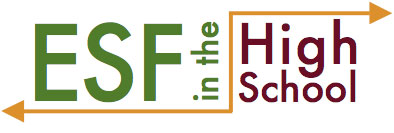SUNY ESF
ESF in the High School

Developing Students and Citizens
The ESF in the High School and ESF Science Corps programs help students prepare to be leaders in the stewardship of both our natural and designed environments, and to be effective citizens for the 21st century.
Environmental problems make headlines every day. Understanding the complex scientific and social issues behind these headlines, coupled with the ability to critically solve these problems, is a requirement in the work place today. This need not only applies to those in STEM fields but to everyone across the education spectrum.
A school/college partnership program that enables qualified students to:
- Experience college-level course work while still in high school.
- Understand the complex scientific and social perspectives behind the environmental issues that make headlines every day such as, the relationship between energy use and the environment.
- Learn about and explore diverse interests and career opportunities in environmental science, engineering, management, policy and design - and in related areas such as law, communications, technology and medicine.
The flagship course is ESF's environmental science course, Global Environment (EFB120, 3 college credits). Key environmental science themes and critical thinking skills form the basis for classroom and experiential learning activities. Global Environment's interdisciplinary approach reflects our enduring belief that all students, regardless of their specific college and career paths, will benefit from an understanding of the linkages among human social systems and biophysical systems.
Students explore the relationships between their local rural, urban, and suburban communities and the broad global context of environmental change. Opportunities abound for including course topics based on available local and regional resources as well as teacher interests, expertise, and experiences. Ultimately, we seek to develop students and citizens who have a solid understanding of science and a sense of wonder and appreciation for the Earth as a system.
Other courses include:
- Writing and the Environment (EWP190, 3 credits)
- Ecology and the Economic Process (ESF122, 3 credits)
- Introduction to Renewable Energy (FCH296, 3 credits)
- General Biology 1 (EFB101 & 102, 4 credits)
- General Biology 2 (EFB103 & 104, 4 credits)
Credits and Grades:
- Credits and grades earned are recorded as part of each student's permanent college academic record which can be transferred to other college and universities throughout the U.S. Official transcripts that indicate that the courses completed are college-level courses with college credit, are available through the ESF Registrars' office. While acceptance at other colleges and universities is not and cannot be guaranteed, credits earned with grades of C or higher typically can be applied to undergraduate degree requirements at many colleges and universities.
ESF in the High School Teachers are qualified high school teachers who must earn an appointment as an ESF Adjunct Instructor. They teach their ESF in the High School course in their school as part of the high school schedule. Teachers participate in mentoring and professional development relationships with ESF faculty and educational specialists, and with other ESF in the High School teachers. Participating teachers and students form learning communities through which they share information, teaching/learning experiences, and related ideas and materials. Each participating teacher receives:
- Mentoring, course preparation, and consultation with College faculty and staff throughout the academic year.
- Professional Development opportunities specifically designed for - and with ESF in the High School teachers. In addition, adjunct instructors may participate in other ESF faculty professional development programs.
- Onsite and offsite use and borrowing privileges at the ESF library.
- Parking privileges on the ESF campus.
Advantages for students and families
- Earn college credit earlier at a small fraction of the cost.
- Experience college-level work and earn credit within a supportive and familiar high school environment.
- Complete college-level general education requirements in high school
Ready to register for ESF in the High School?
Students must contact their high school teacher for the an online registration link.
- Contact Maura H. Stefl, mhstefl@esf.edu
